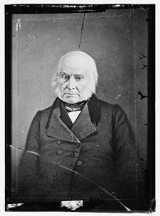
(1825–1829). He served as an American diplomat
, Senator
, and Congressional representative
. He was a member of the Federalist, Democratic-Republican, National Republican, and later Anti-Masonic
and Whig
parties
. Adams was the son of former President John Adams
and Abigail Adams
. As a diplomat, Adams played an important role in negotiating many international treaties, most notably the Treaty of Ghent
, which ended the War of 1812
.
Individual liberty is individual power, and as the power of a community is a mass compounded of individual powers, the nation which enjoys the most freedom must necessarily be in proportion to its numbers the most powerful nation.![]()
This house will bear witness to his piety; this town, his birthplace, to his munificence; history to his patriotism; posterity to the depth and compass of his mind.![]()
In charity to all mankind, bearing no malice or ill will to any human being, and even compassionating those who hold in bondage their fellow men, not knowing what they do.![]()
My wants are many, and, if told, Would muster many a score; And were each wish a mint of gold, I still would want for more.![]()
I want the seals of power and place, The ensigns of command, Charged by the people's unbought grace, To rule my native land. Nor crown, nor scepter would I ask But from my country's will, By day, by night, to ply the task Her cup of bliss to fill.![]()
The great problem of legislation is, so to organize the civil government of a community ... that in the operation of human institutions upon social action, self-love and social may be made the same.![]()
To furnish the means of acquiring knowledge is ... the greatest benefit that can be conferred upon mankind. It prolongs life itself and enlarges the sphere of existence.![]()
This hand, to tyrants ever sworn the foe, For Freedom only deals the deadly blow; Then sheathes in calm repose the vengeful blade, For gentle peace in Freedom’s hallowed shade.![]()

